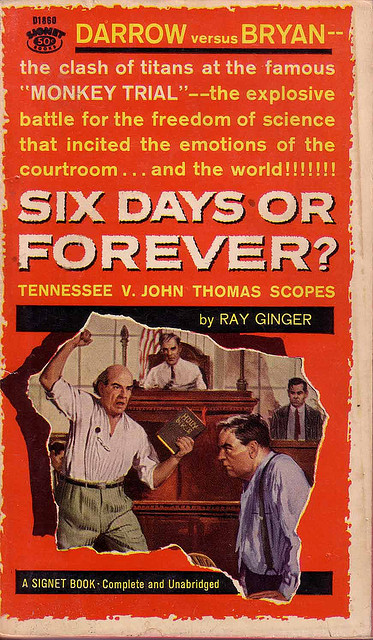
In order to prepare for a talk about the Scopes trial, I was recently rereading Ray Ginger’s Six Days or Forever? Tennessee v. John Thomas Scopes (1958). It isn’t a bad book, although if I were to recommend a single book about the Scopes trial, it would have to be Edward J. Larson’s Summer for the Gods (1997). (I’m not alone in my esteem for Larson’s book: it won the 1998 Pulitzer Prize in History.) But Six Days or Forever? is certainly worth reading anyhow. Joseph Wood Krutch described it as “incomparably the truest account ever written of the facts as they occurred, of the personalities involved, of the social, political, and moral forces at work, of the whole atmosphere of the event.” He was in a position to know, having reported on the trial for The Nation.
A feature of Ginger’s book that struck me anew, though, is the vocabulary. I have a taste for unusual words myself—for instance, I was delighted to have a chance to use “enthymematic” not so long ago—but there seemed even to me to be a plethora of unusual, obscure, and confabulated words. Don’t take my word for it. Consider my list of the top twenty-five most unusual words in the book: Adullamites, autochthonous, blandished, cenoby, corybantic, daddy-ridden, diaphanous, dread-bin, eupeptically, fardel, febricant, filiopiety, fleered, hogma, masty, multifoliate, propaedeutic, reticular, rowel, scurf, sodality, squires, tessera, uncurried, wroth. Six Days or Forever? is a book you want to read with a dictionary handy.
How many of these words would you say that you recognized? That’s not really a fair question. A lot of them are clear from context; three of them are coinages (at least one a pun) that are understandable only in context. While reading, I felt the need to look up only four of them—“Adullamites,” “cenoby,” “febricant,” and “masty”—and in retrospect I should have been able to figure out the meanings of “cenoby” and “febricant” from their roots. But only a few of these words would I feel comfortable using in my own writing, at least without a really compelling reason to do so. Having assembled a list of the twenty-five most unusual words in the book, though, I thought that I’d go the extra mile and give you their definitions. Here are the first ten, with the remaining fifteen to follow in part 2.
Adullamites: “Darwin and the Adullamites” (p. 68; the title of chapter 4). In the book of Samuel, David and “every one that was in distress, and every one that was in debt, and every one that was discontented” seek refuge from Saul in the Cave of Adullam. Adullamites are thus, generically, people who are out of power but plotting their return.
autochthonous: “Wherever the verbal garment is thin, wherever the skeleton shows, there the old theme, the autochthonous itch: Parents live forever in their descendants …” (p. 134). A purple synonym for “native” or “indigenous” in a correspondingly purple passage. Literally and originally, autochthones were born from the earth.
blandished: “[Darrow’s] conclusion explained, evaded, blandished, and, finally, apologized” (p. 152). He is addressing his previous insult to the court (see “propaedeutic” in part 2), using cajoling and flattery and such blandishments. The Oxford English Dictionary’s latest citation for the intransitive verb “blandish” is from 1612.
cenoby: “Here, at long last, was certainty. A cenoby everlasting” (p. 43). A cenoby is a religious community, like a monastery or a nunnery. In discussing Bryan’s attitude toward the Atonement, Ginger uses a virtually obsolete term for a virtually obsolete institution, presumably in order to suggest that the doctrine, too, is virtually obsolete.
corybantic: “…religion in the South, as earlier on the Western frontier, was often corybantic” (p. 14). In classical antiquity, the Corybants, or Korybantes, worshipped Cybele with wild and frenzied drumming and dancing; “corybantic” thus means in a wild or frenzied way. I’ll bet that few Southerners actually worshipped Cybele, though.
daddy-ridden: “And Tennessee was by no means the most daddy-ridden of the Southern states…” (p. 17). The meaning is clear: Ginger means that Southerners “voted the way their fathers had, thought the way their fathers had.” But the coinage is all but unique to him: there’s only one instance of the word in Google Books that isn’t due to Ginger.
diaphanous: “…[Darrow’s] diaphanous voice revealed the truth of human existence, a truth that rebuked Bryan’s weak-minded optimism” (p. 136). Translucent, and therefore revelatory. But the metaphor, already awkward, clashes with Ginger’s earlier description of Darrow’s oratory: “He used words as an artist uses paint,” etc. (p. 107).
dread-bin: “And the fundamentalist minister, sparsely stocked as he was in food for the intellect, tried to compensate by a well-larded dread-bin” (p. 63). A coinage unique to Ginger, and probably a pun on “bread-bin” (which the Oxford English Dictionary vouches for, while unaccountably omitting the term in my idiolect for it: “bread-box”).
eupeptically: “Then [Darrow] understood, and he grinned eupeptically as he tugged at his galluses and shuffled to the bench” (p. 95). In a way characteristic of good digestion, and thus, by extension, cheerfully. Judging from the citations in the Oxford English Dictionary, Thomas Carlyle was especially fond of the word.
fardel: “To harden the fardel there stood, behind Silas Lillard Bryan, the ecclesiastical prototype of the Apostles…” (p. 186). A fardel is a burden, which anyone familiar with the most famous soliloquy from Hamlet will remember: “… Who would fardels bear, / To grunt and sweat under a weary life.” But why “harden” rather than “increase”?

